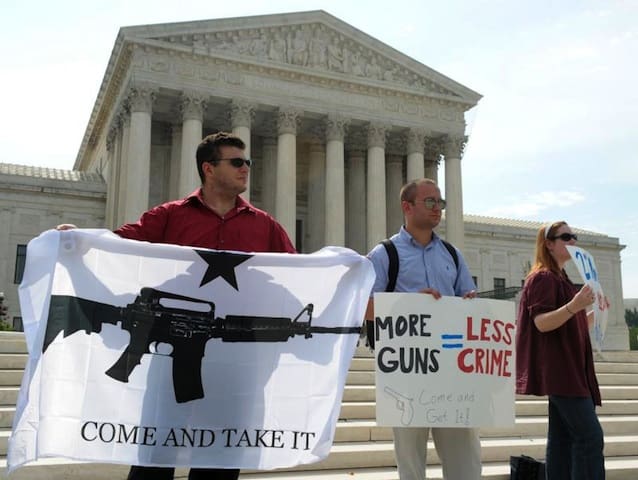The rabidly anti-gun rights New York Times is in a bit of a pistol-packing pickle. They love them some constitutional rights, but hate OPG (Other People’s Guns—owner Arthur Sulzberger has a concealed carry permit). Et voila! This morning’s bi-polar editorial The Second Amendment’s Reach. “We disagreed strongly with the 2008 decision, which took an expansive and aggressive view of the right to bear arms,” The Gray Lady reminds its base. “But there is an even broader issue at stake in the new case: The Supreme Court’s muddled history in applying the Constitution to states and cities. It should make clear that all of the protections of the Bill of Rights apply everywhere.” And yet . . .
“It is unlikely that the court will delve directly into the gun issues. If it decides to apply the Second Amendment to cities, it would probably send the case back to a lower court to evaluate the Chicago law. If that happens, the justices should guide the court in a way that makes clear that reasonable gun restrictions will still be upheld. The Supreme Court’s conservative majority has made clear that it is very concerned about the right to bear arms. There is another right, however, that should not get lost: the right of people, through their elected representatives, to adopt carefully drawn laws that protect them against other people’s guns.” Yeah, sure. Here’s the real bottom line:
At the moment, federal, state and local laws put the burden of proof on citizens to prove that they should be allowed to own and carry a gun. The restrictions—handgun bans, waiting periods, requirements to lock weapons, etc.—are all based on society’s supposed right to protect itself (from legal gun owners, go figure).
If the Supremes uphold their ruling in the Heller case—striking down a Washington, D.C. gun ban—the onus will be on the government to prove that an individual shouldn’t have the right to bear arms. At the same time, it will assert that federal constitutional protections can not be over-ruled by state and local jurisdictions.
So now you know.





As most (honest) Constitutional scholars will tell you, Federal law MUST supersede State and Local laws – otherwise, we'd revert back to all the problems the nation faced when we were under the Articles of Confederation. However…
The founders were absolutely, positively explicit in their desire to limit the reach of the Federal government, to wit: Amendment 10: "The powers of the Constitution, nor prohibited by it to the states, are reserved to the states respectively or to the people."
The problem alluded to in the final paragraph regards when the Federal government attempts to exceed it's own Constitutional limits, and control things that it has no business regulating. In the 1930s a case came before the Supreme Court that concerned the rights of an individual (a farmer) to grow whatever he wanted to (wheat) on his own land. The Supremes ruled essentially that the needs of the many outweighed the rights of the few, by a shall we say 'creative' interpretation of the Commerce clause. This opened the floodgates for the Feds to claim the right to regulate just about everything, from aspirin to zucchini – all under the banner of "regulating" interstate commerce. The Feds have since broadly interpreted the Commerce clause to allow them to regulate just about everything – including guns. There are a number of cases currently before the court that may change all this. Utah and Montana, for instance, have filed cases challenging the right of the Federal government to regulate the sale of guns 'n ammo manufactured locally and sold within the state – as the Commerce clause specifically covers commerce between the states. If the Supremes reinterpret the Commerce clause and specifically limit it's scope, it has the potential to overturn literally thousands of Federal regulations, and severely limit the scope of just what the Feds can monkey with – including the sale, distribution, and control of guns and ammunition.
Let's just say that this season of The Supremes is gonna be must-watch TV for just about everybody.
Comments are closed.